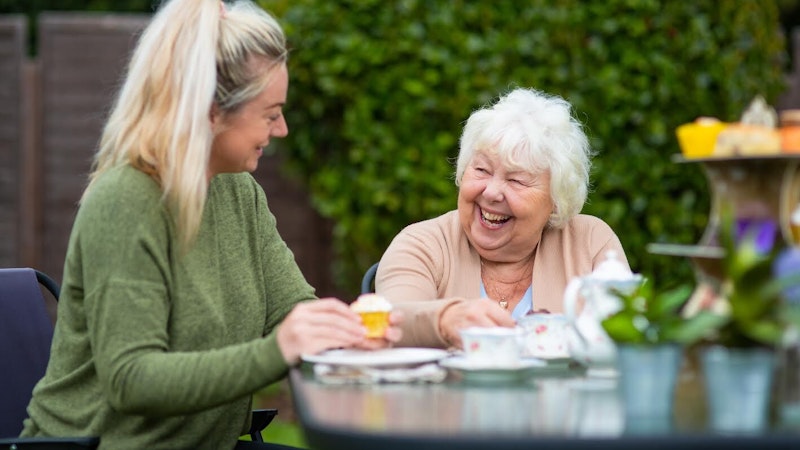
For Dementia Action Week, we linked up with home care company Helping Hands, to learn more about how to support someone with Dementia, and how to find the appropriate help and support.
Dementia Action Week (15th -20th May) is an annual nationwide event led by the Alzheimer's Society where the public is encouraged to take action to enhance the lives of individuals impacted by Dementia. In the UK, 34.5 million of us know someone living with Dementia. Statistics indicate that one in three individuals born in the UK today will develop dementia during their lifetime. By 2025, one million people will be living with Dementia, making Dementia care one of the most significant challenges confronting our society. With limited existing treatments, the reliance of individuals affected by Dementia lies on social care, not just the NHS. Since people with dementia make up the majority of social care users, it is crucial that the care system is tailored to their needs.
Deanna Lane, Clinical Manager and Dementia specialist at Helping Hands, answers some critical questions.
How can having a loved one with Dementia affect a family?
The family member with Dementia usually becomes the family’s centre of attention. Energy is focused on this person. Sometimes this can lead to other family members, including spouses or children, feeling neglected. They may become resentful because they feel they are not getting the attention they need.
The burden of caregiving can put loved ones at increased risk of significant health problems, and many Dementia caregivers experience depression, high levels of stress, or even burnout. Nearly all Alzheimer’s or Dementia caregivers sometimes experience sadness, anxiety, loneliness, and exhaustion. There may be financial losses experienced too.
What advice would you give someone caring for a loved one with Dementia?
Caring for someone with Dementia can be challenging. Carers may need support to look after their loved one so that they can look after themselves too.
There is practical help available with care needs and caring for your loved one in your own home. This support can ensure your loved one continues living their life in their own environment. Carers who may feel isolated can join carer’s groups and online groups. There are also Memory cafes and day centres to visit, which can provide support for both the carer and the person experiencing Dementia.
The Alzheimer’s Society offers practical advice for more specific issues such as managing finances. In the early stages, it is good to write down a person’s hobbies and interests, The Alzheimer’s Society has a downloadable leaflet called ‘This is me’ where these interests and hobbies can be recorded. This leaflet can be useful for others to learn the interests of your loved one to ensure that person-centred care can be given when needed.
Dementia may change a person's behaviours, this can be challenging and upsetting for carers. Help and advice are available for loved ones to help identify what the problem is and look at the situation to be able to develop a strategy to alleviate this distress. Discussing concerns with healthcare professionals to help you identify the reasons for the distress can help to manage this behaviour.
Carers need to look after themselves to be able to look after their loved one. This may mean accepting support from family and friends or other support to enable carers to undertake hobbies, interests of their own or to undertake practical tasks.

How do you help to manage the impact of the initial diagnosis considering the emotional, practical, and clinical issues?
It can be difficult to cope with and accept a diagnosis for both the person with Dementia and those close to them. Feelings of denial, loss, grief, anger and helplessness are common. But it is important to know you are not alone and support is there for you. Professional healthcare workers can put you in touch with the right support and support groups.
What should someone who is looking for care for a loved one with Dementia look out for when choosing a care provider?
Make sure the company you chose employs staff who are trained in Dementia. Look out for Dementia specialist providers, and read online recommendations, reviews, and testimonials.
How does your organisation support people experiencing Dementia?
All staff giving care at Helping Hands are trained in Dementia. I am the specialist for Dementia and I respond to individual needs and advise across the business to ensure that person-centred outcomes for individuals are achieved.
A large part of what we do is really person-centred care, in the customer’s own home with all their belongings and memories. We help keep customers in their own homes by using engaging activities that are tailored to suit their personal preferences.
Can a care seeker expect all providers to be able to support an individual living with Dementia?
No, not all providers are registered to give Dementia care. It is important to ask potential providers about training of their staff and support that they can give to the customer and the family.

What training should a service user expect staff to have, and who is trained?
All staff giving care to customers living with Dementia should be trained in person-centred care.
What technology is available to support people with Dementia?
There are numerous assistive technologies that can support individuals with Dementia. These include specialised clocks that indicate day and night, automated pill dispensers, and locator devices designed to find frequently misplaced items like keys. Additionally, a unique plug has been created to prevent bath flooding.
In the realm of safety, several technologies have been developed to aid individuals with dementia. Gas detectors, high-temperature sensors, and smoke detectors have been designed to either sound an alarm or modify the supply to ensure safety.
There are also apps and electronic packages that support meaningful activity with your loved one.
For more information on Dementia and Dementia care, read our Care For Dementia guide.
